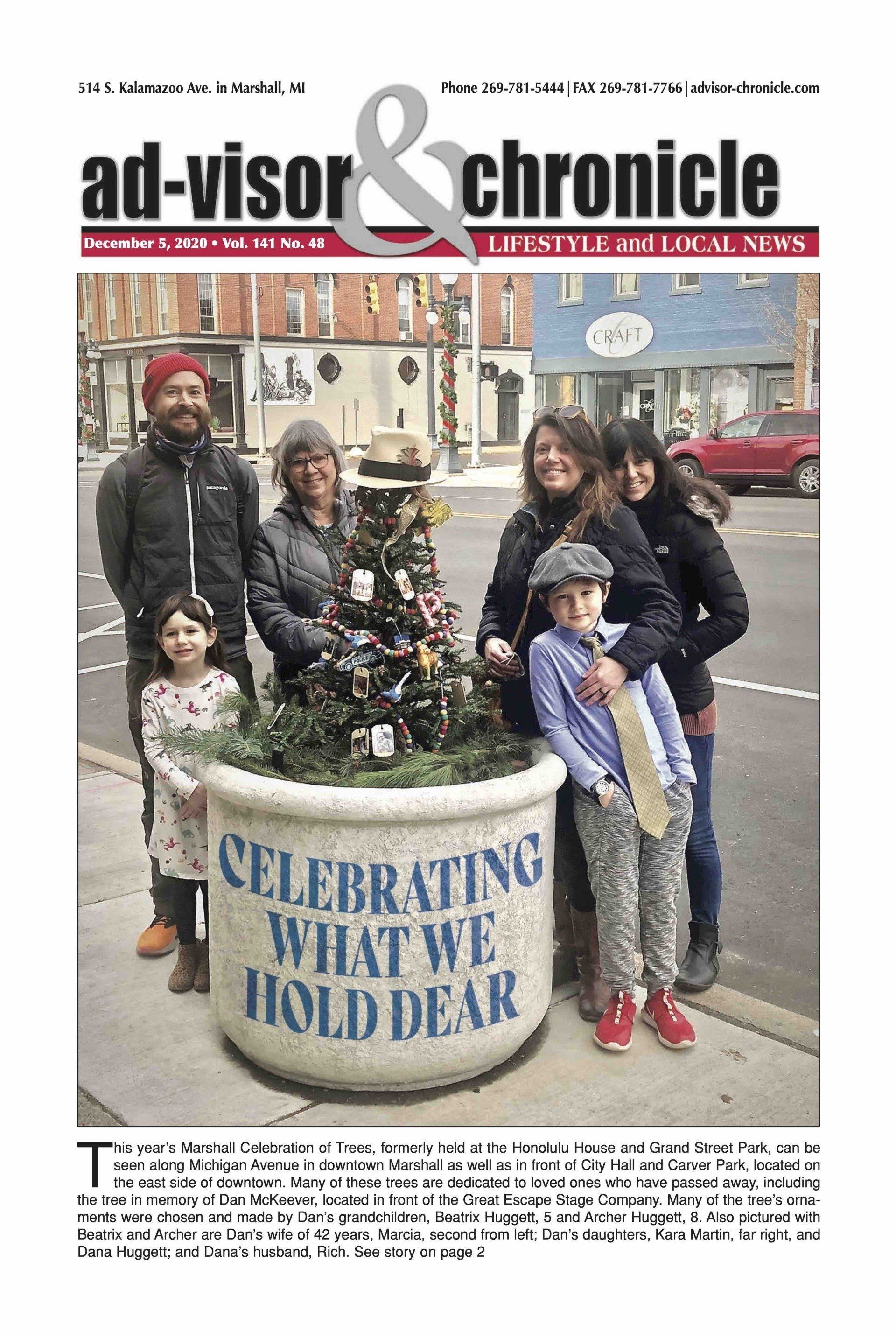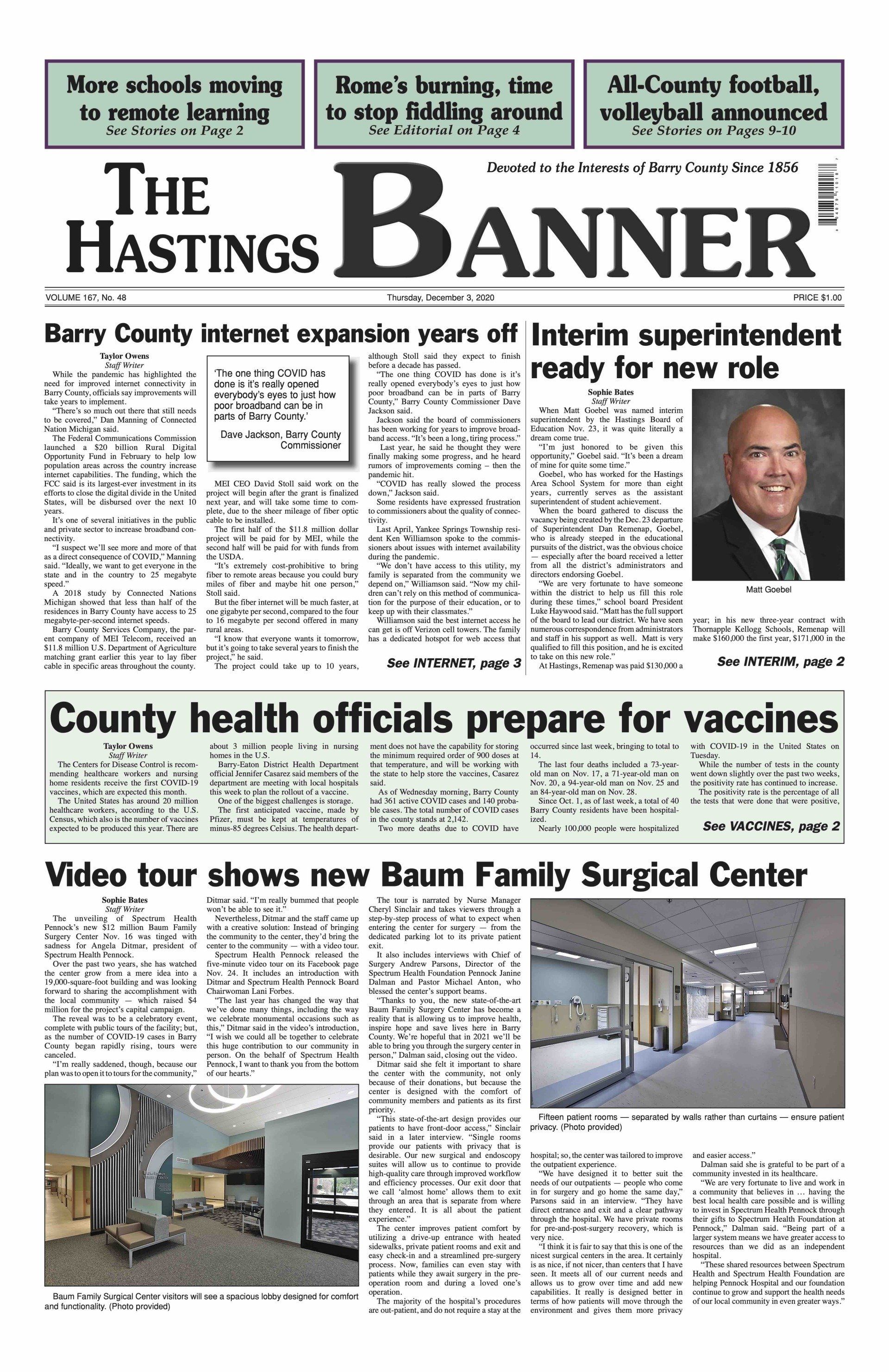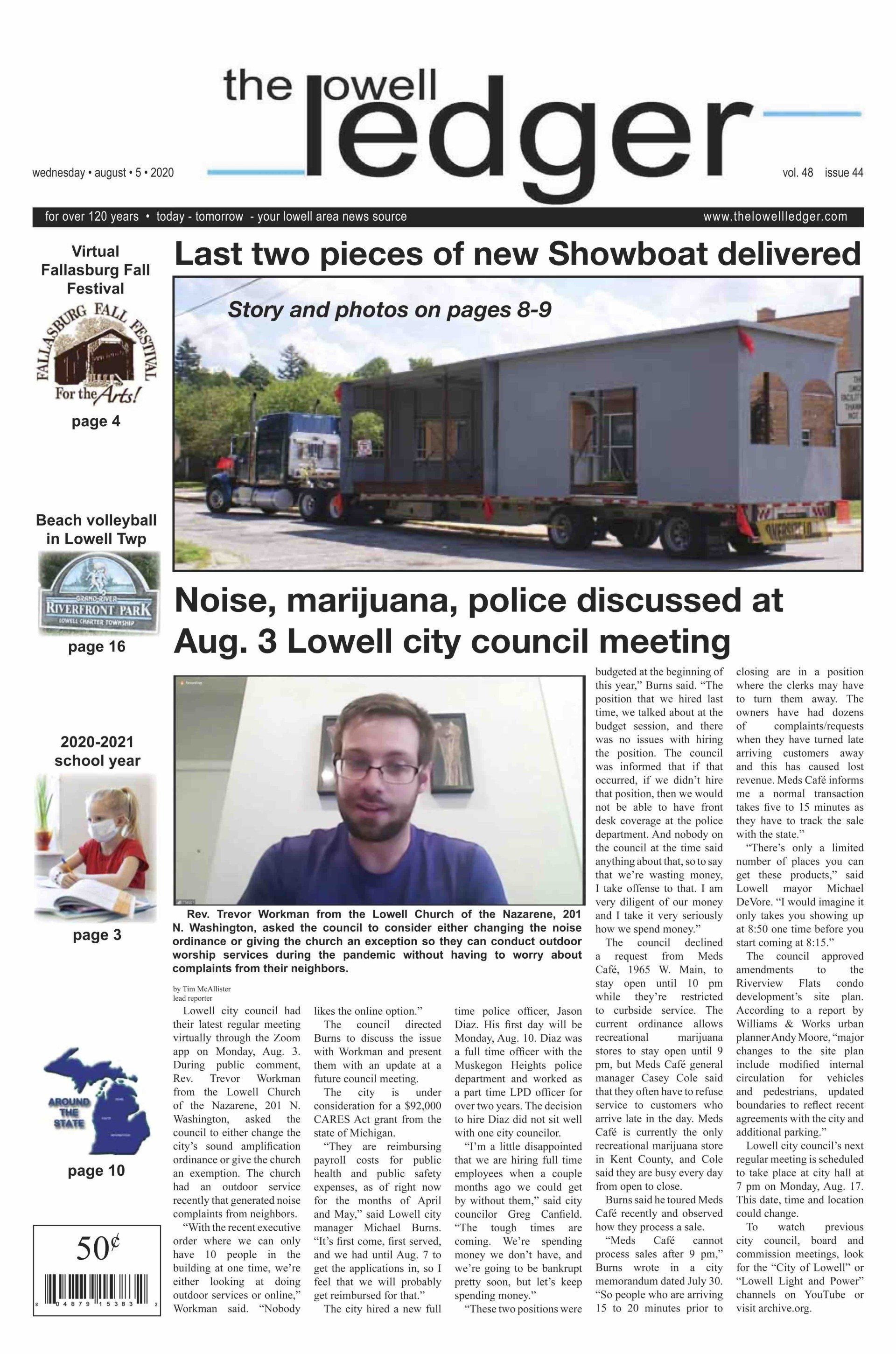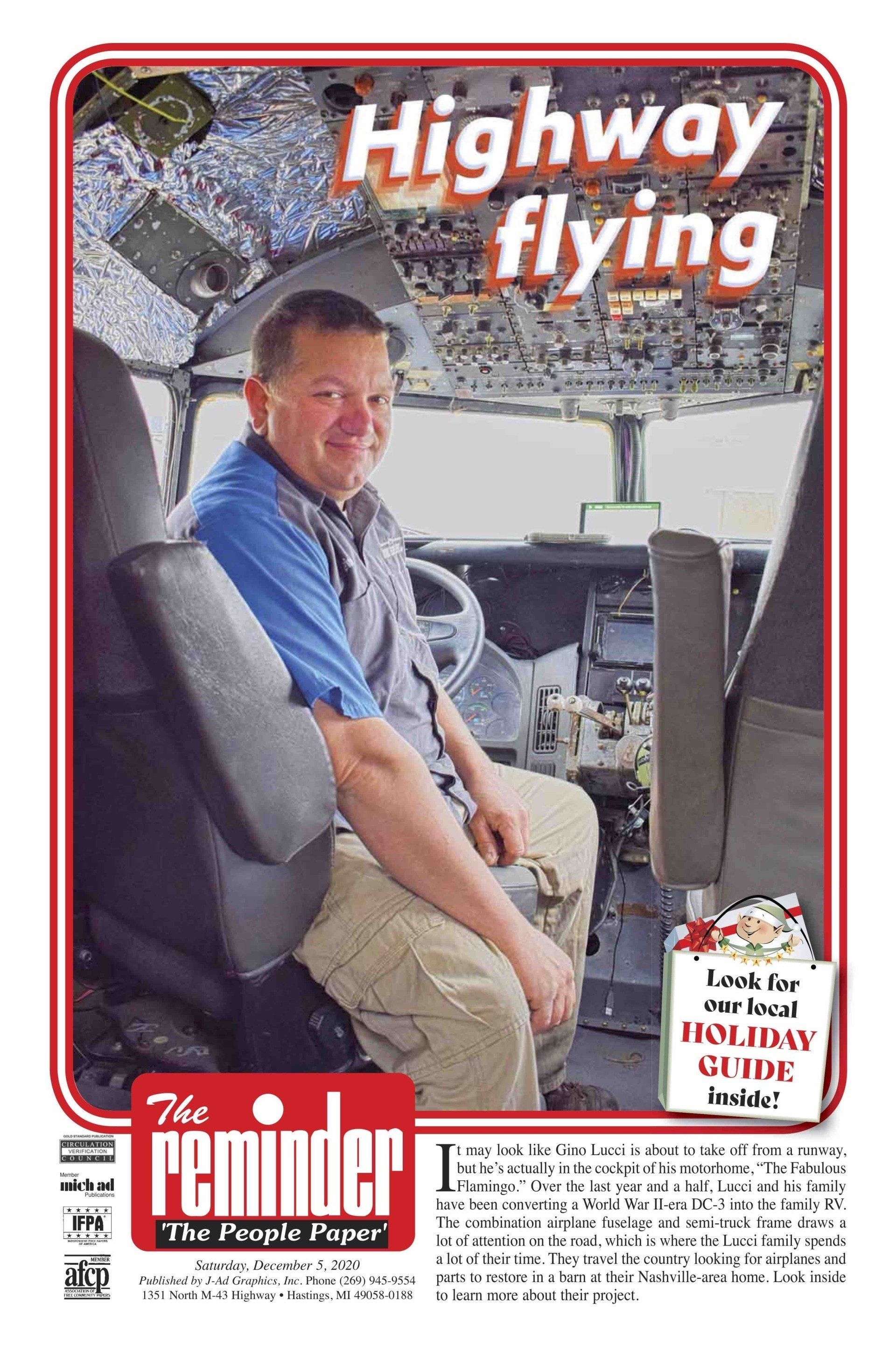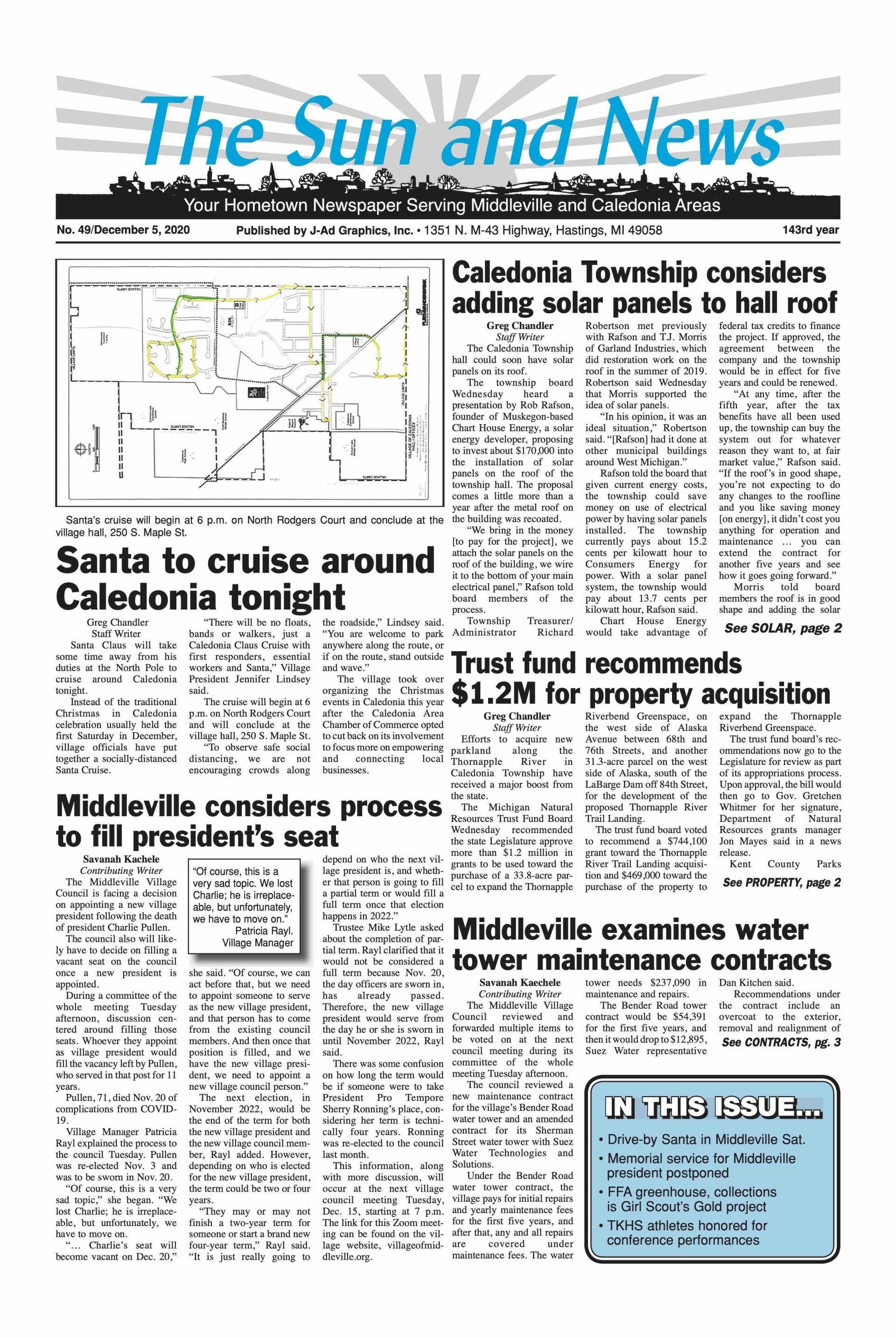No-fault reform claims quality of care: Middleville family running out of options
Benjamin Simon • October 23, 2021
Five days a week, 45 minutes a day, Troy Hughes visits with a therapy assistant. They pull out his arms. They open up his fingers and stretch them out. They put him on a tilt table and stand him up. Then they’re done.
That’s the therapy Troy Hughes receives. It's the bare minimum. “Maintenance therapy,” they call it. But it keeps him alive and functioning.
After suffering a traumatic brain injury on a motorcycle 14 years ago, Hughes requires 24/7 care. He cannot speak. He cannot swallow food or water. He wears an adult diaper.
If Troy didn’t receive the therapy, he would curl up. His arms would hug his body and his fingers would ball into a fist – permanently. If that happened, he couldn’t even do the few things that he can do now – like spell out words in his mother’s palm.
That’s what his mother, Teresa, worries about. Barring any “11th-hour legislative relief,” President of Continuing Care at Spectrum Health Karen Pakkala said, Spectrum Neuro Rehabilitation Homes, where Troy lives, will close the doors of its six homes as a result of changes to the no-fault auto insurance law.
Then Troy will go from a facility with 30 people to the Spectrum Nursing Center with 160 beds.
After his injury in 2007, he spent a year in the same skilled nursing center. The thought of him returning there brings Teresa to tears. She can’t help but remember the grim details – how no one took him out of his bed, how he was never dressed and how he often laid in feces and urine with just one shower a week.
“Sad, very sad,” said Teresa, a Middleville resident. “It’s just not fair to throw him into a sterile hospitalized kind of life in a room where there’s half the staff so he would just be sitting there staring at a TV all day long.”
The no-fault auto insurance reform, which went into effect July 1, cut reimbursement rates by 45 percent for Medicaid payable medical expenses for survivors of traumatic brain injuries.
“It's cutting funding back to what reimbursement levels were 30 years ago,” Tom Judd, president of the Michigan Brain Injury Provider Council, said. “There are no businesses that can operate under the same revenue stream that they were operating under 30 years ago. It’s just not reasonable.”
Before the reform, victims of auto accidents received full coverage for their medical costs. Now, places like the Neuro Rehabilitation Homes are having to close because of the drop in payment. As a result, people, like Teresa, are left to wonder what will happen to their loved ones.
***
Fourteen years ago, Troy Hughes was waiting to turn left at an intersection in Middleville when his motorcycle was hit by a pick-up truck.
Then 19, he was in critical care for 10 weeks. If Troy lived, the doctors told Teresa, he would be a “vegetable.” But she wouldn't let them take him off life support. He squeezed her hand and that was all she needed to know that the Troy Hughes she once knew was still there, somewhere.
Before his injury, Troy was loud and had a lot of friends, she remembered. Teresa called him “everybody's favorite bad boy in Middleville.”
“Peace out,” she laughed, imitating Troy and making a peace sign. “He just was in your face. Yeah, he was, he was really popular.”
After graduating from Thornapple-Kellogg High School in 2006, Troy went to work for Comcast. He started as an installer and advanced to team leader in the span of seven months. Then came the crash.
Before the accident even hit the news, 300 people visited the hospital to see Troy, Theresa said. There were so many people that the security guard had to take them down to the elevator in groups for smoke breaks.
Troy spent a year in Spectrum Nursing Center before he was moved to Homewards North in the Neuro Rehabilitation Homes, often referred to as an “adult foster care home,” where residents receive 24-hour supervision from caregivers who have specialized training working with people who have brain injuries.
He was put on “aggressive therapy” for two and a half years. He would ride horses, write, roll himself over and pedal a bike. Slowly, he got better and Teresa even has a photo of him standing in his room with a walker.
While he was in critical care, Teresa lost guardianship of Troy, who was assigned a state-appointed guardian. The next few years were messy, as Teresa battled with the former guardian in court about the best steps forward for Troy. In the process, Troy lost the aggressive therapy and switched to maintenance therapy against Teresa’s wishes.
His living situation in the Neuro Rehabilitation homes is not perfect, Teresa said. Without the aggressive care, he has lost muscle and the ability to swallow. But that's better than leaving there, Teresa said.
The staff workers know Troy, or “Troy-seph” (like Joseph) as they call him, at the home. They know he doesn’t like when they brush his teeth too hard. They know he’s upset when he shakes. And they know, when he blinks twice, he means “yes.”
Before COVID-19, they took him out on trips to the county fair or a Grand Rapids Griffins hockey game, one of his favorites. Teresa visits at least three days a week when she can take him out for walks to the gazebo and koi pond.
“That's his home,” she said. “It's not a sterile hospital room. It’s where he's lived for the last 13 years. His bedroom’s there. His housemates are there. Some of the same people have been working there the entire time. And they all care and love him.”
When Spectrum Neuro Rehabilitation closes its doors in the coming weeks, Troy will move to the skilled nursing center, where he will live in a larger setting without the same kind of care.
“We know it’s not what’s desired,” Pakkala said. “It's not what we would want to do. What we would love is a different solution.
“Right now, we're working within the confines of the options we have.”
Pakkala said they are trying to ease the transition by providing virtual tours, speaking with guardians and moving some of the caregivers from the Neuro Rehabilitation Homes into the skilled nursing center.
But the features of the adult foster care home cannot be replicated due to the size of the skilled nursing center.
“In the residential program, they have a lot of customized attendant care that's able to focus on very specific needs of the individual patient,” Pakkala said.
“There's a fair amount of activity around re-entry into the community, very much a customized individualized program, and they have a small home setting. ...[In the skilled nursing home,] everything is on a larger scale. There are many more residents in our program.”
In adult foster care homes, Judd estimates that, on average, caregivers work with anywhere from three to five patients. In nursing homes, that number can balloon to 10 to 12.
“They don't have the specialized care and training for individuals with severe brain injuries that have cognitive needs, behavioral problems, emotional regulation,” he said.
Teresa worries most about the social aspect of the skilled nursing facility, where he will lose the friends he has developed and the space he is comfortable in. She was told that she cannot take him outside and she can only speak with him through a Plexiglas door.
“I worry that he's going to be left in his room a lot, alone, because there's not a living room for him to be in,” she said. “ ...He’ll be in a room with who knows who. It's scary to think that you would be in a room with somebody that’s incompatible.”
In response to the changes to the no-fault auto insurance law, the state has set aside $25 million for those survivors who were in the system before the new law passed.
But that won’t solve the problems Neuro Rehabilitation is facing. They’ve tried to stay afloat for the last few months, but they can no longer continue to operate with the reduced reimbursement rates.
“Even $25 million, it seems an extraordinary amount of money, it isn't going to sustain the program work in perpetuity,” Pakkala said. “We want a long-term solution for patients. That might be a Band-Aid for a bit of time for some providers, it might help us over the next few months, but it's not going to sustain the program forever.”
Judd has continued to hear about people struggling to access the $25 million, which requires a lengthy application process. And even if they do access the money, the funds are capped at $500,000 per calendar year for each provider, he said, which cannot sustain the costs of living for people who require 24/7 care. He doesn’t know of anyone who has been able to secure the funds.
“It might help to save a case here or there, but it's not going to allow a business that would otherwise not be operational to sustain operations,” he said.
Following a presentation on the state budget at the Tyden Center on Oct. 1, State Rep. Julie Calley, R-Portland, said there haven’t been any updates to the auto insurance reform.
And she doesn’t foresee any taking place.
Calley said that she has heard of people accessing the $25 million and, to her knowledge, “it's working once we connect them.” She noted that the state will continue to use the $25 million as a primary solution. From there, they will then collect data, she said, and determine best steps forward.
“It's actually collecting data and understanding – what do these services cost?” she said. “What are the expenses that are incurred? Obviously, they need to make something above that, or they're not going to stay in business, right? So we want to make sure that it's a sustainable system that properly supports these businesses or individuals, depending on the size of the provider.”
When Teresa heard in August that they were going to close Troy’s house, she responded by contacting every state legislator she could find. She wrote a page-long letter describing Troy’s situation and asking for help. Then she sent the letter to 50 politicians, including state representatives, senators and even the governor. She spent $20 in postage and mailed them to the Capitol, but that batch bounced back.
So she sent out another batch. This time, she sent the letter to each representative’s individual office and forwarded a personal email to Calley, who called Teresa back on Thursday.
“You get desperate, you do desperate things,” she said. “I don't know what else to do.”

A new court date has been set for a 24-year-old Battle Creek man accused of threatening campers at the Welcome Woods campground in Carlton Township last month. Trevor Dean Leiter is scheduled to appear for a probable-cause conference June 15 in District Court 56B. A conference had been scheduled for last week but was adjourned, court officials said. Leiter is charged with three counts of felonious assault and one count of reckless use of a weapon in connection with the May 16 incident at the campground on Welcome Road, north of the city of Hastings. Michigan State Police received a report of a domestic dispute involving the suspect and his girlfriend. Prior to troopers arriving, Leiter threatened people at the campground and started “shooting rounds into the air from a handgun he had pulled out of a backpack,” the Barry County Sheriff’s Department reported. When troopers arrived, Leiter initially refused to exit the RV, and officers surrounded the vehicle. The Barry County Sheriff’s Department Special Response Team was called to assist. “Members of the SRT were able to quickly control of Leiter and handcuff him to the rear [of the RV],” the sheriff’s department report said. “After standing him up and trying to escort him to a patrol vehicle, he began resisting. Leiter had to be pushed towards the patrol vehicles. Leiter became more resistant and had to be brought down to the ground and held down.” Once in the patrol vehicle, Leiter kicked at the windows in the vehicle. Then at the jail, Leiter continued to resist corrections officers and had to be placed in a restraint chair, according to the sheriff’s department report. The girlfriend escaped without injury, and no one else was hurt in the incident. Leiter is being held on a $10,000 bond in the Barry County Jail.
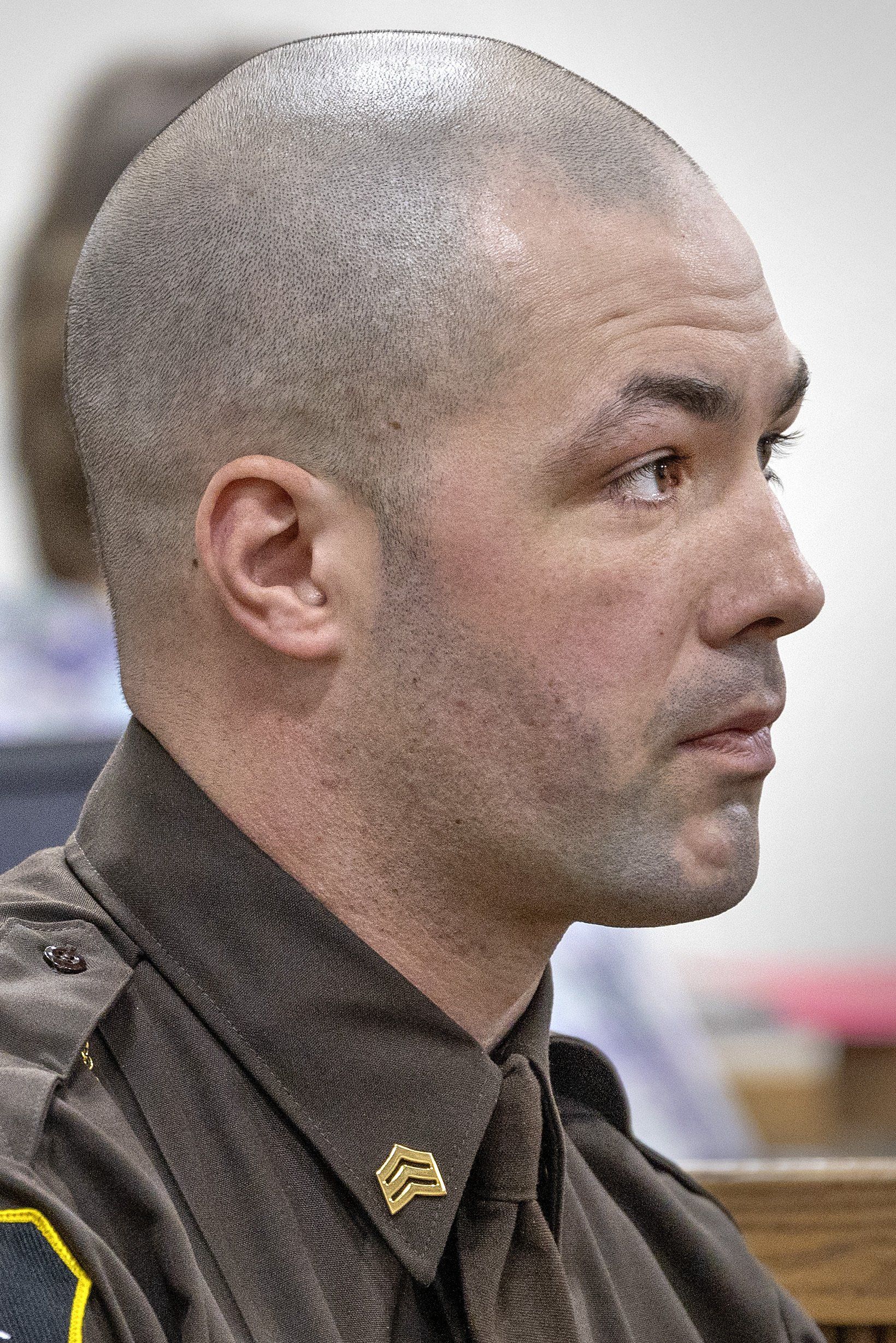
Sgt. Scott Ware with the Barry County Sheriff’s Department received the 2022 Police Officer of the Year Award for his actions during an Aug. 4, 2021, car chase and shootout in Woodland. Ware was recognized by the Police Officers Association of Michigan at its annual convention in Grand Rapids. “For bravely putting the lives of others before his own by stopping an armed shooter before he could do any real harm, Sgt. Scott Ware is one of the Police Officer of the Year award recipients,” a press release reads. “The teamwork of all officers on the scene and the courageous, tactical decisions of Sgt. Ware allowed the whole incident to end without any civilian or police officer casualties.” Undersheriff Jason Sixberry said the department is lucky to have Ware. “Scott’s done a great job here and with everything he’s done to keep the community safe,” Sixberry said. “We’re proud of him and his accomplishments and him receiving the award. It’s a pleasure of ours to have him go from a deputy up to a sergeant position, being able to instill his good values and hard work ethic in the department.” The encounter started when police were alerted that Timothy Riddle was suspected of stealing two shotguns from a Hastings resident on the 1000 block of North Coville Road. Police in the area were notified to keep a lookout for Riddle. A Hastings City Police officer saw Riddle’s vehicle at a gas station on M-43 in Hastings at 6:48 p.m. that night. Riddle was stopped by police as he was leaving the station. When police started to question Riddle, he grew agitated and sped off, heading north on M-43. Police reports and testimony in court said Riddle reached speeds as high as 115 mph. Officers from the city police and the sheriff’s department, including Ware, joined the chase. Police reported that Riddle pointed a shotgun out the window at pursuing officers throughout the chase. The chase ended at the Mobil gas station parking lot on M-43, east of Woodland. Police reported that Riddle leveled a shotgun at officers after exiting his vehicle and began approaching them. Ware, who was still inside his police cruiser, readied a rifle and fired several shots through the windshield of his vehicle. Those actions are credited with causing Riddle to stop shooting and retreat into the gas station. One customer escaped and two employees hid inside the store. They later were able to leave the station unharmed, police report. Riddle barricaded himself inside the station for seven hours while police negotiated with him. The standoff ended at 1:30 a.m. when Riddle surrendered himself to police. He was later convicted of 21 criminal counts. During Riddle's trial, Barry County Judge Michael Schipper reviewed the incidents as they had occurred that day. Remarkably, the judge pointed out, no one was hurt. That was because of the police officers who responded to the scene, he said. And Ware was a key reason for that, according to the police officers association.

Despite a near 90-degree forecast, a strong breeze from the south kept participants and spectators comfortable as the annual Memorial Day parade wound through Hastings Monday morning. The event, hosted by Lawrence J. Bauer American Legion Post 45, made its traditional stops, pausing at Tyden Park and the bridge over the Thornapple River before ending at Riverside Cemetery. The parade stepped off at 9:30 a.m. from the intersection of Boltwood and State streets, with the Legion’s color guard, followed by the honor guard, Legion members and other veterans, National Guard and Reservists, Legion Auxiliary, Legion Riders, the local Disabled American Veterans chapter members, Sons of the American Legion, Scouts, Hastings Area Schools Marching Band and other participants. They walked through downtown, making their way to the Veterans Memorial at Tyden Park, where attendees heard a speech from Steve Carr, an Air Force veteran. Carr served as the commander of Post 45 for three years before taking over as the current Michigan District 4 forward commander. He began his speech by honoring the final 13 U.S. service members who lost their lives in Afghanistan. He shared a little bit about each person – their names, where they came from and details about their lives. “Not only are these diverse men and women forever in our hearts, but for those who knew him, they are forever young,” he said. “They came from every background, yet they shared a common goal: To serve America and make life better for others.” Carr went on to highlight the importance of Memorial Day. “Memorial is not about picnics and parades, though there is nothing wrong with enjoying and celebrating our American way of life,” he said. “Memorial Day is about gratitude and remembrance. It is about honoring the men and women who made it possible for us to gather here today in peace. But the reason there is a Memorial Day, the reason we gather here, is to remember who made our way of life possible. They truly are the guardians of our freedom.” Following Carr’s speech, two wreaths were placed at the memorial. One wreath honored all veterans and the other honored prisoners of war and those still missing in action. The group then made its way to the bridge on Broadway, where a wreath was tossed in Thornapple River to honor those who have served or are serving at sea. Both stops included a rifle salute by the Post 45 honor guard, followed by playing of taps by two Hastings High School band members. The parade then moved to Riverside Cemetery where a brief ceremony took place, as it has for many years, near the Grand Army of the Republic marker, beyond the Avenue of Flags. Those 43 flags, Jim Atkinson pointed out, were donated by the families of 43 veterans, who were presented the flags at the time of the veteran’s death. Throughout the large cemetery, Atkinson said, another 500 or so small U.S. flags mark the graves of veterans buried at Riverside. As in the past, local Scout groups helped place the flags in recent weeks. Youngsters and adult volunteers finished the work in about an hour and a half, a grateful Atkinson said. Unlike in years past, a wreath was not placed on the grave of the most recently deceased veteran at Riverside. Dr. Paul Sweetland, who served in the U.S. Army’s 82nd Airborne during the Vietnam War, died in early March. Atkinson said full military honors were conducted during Sweetland’s burial just a few weeks ago. So, the wreath placed at the GAR marker was the final wreath placed Monday. Barry Wood, recent commander of the state American Legion and a Hastings resident, spoke for a few minutes. Like Carr, Wood reminded people of the purpose of Memorial Day. “This is the day we pay homage to all those who served in the military and did not come home. This is not Veterans Day. This is not a day for celebration. It’s a day for solemn contemplation over the cost for our freedom. “Memorial Day was born of necessity. After the American Civil War, a battered United States was faced with the task of burying and honoring the 600,000 to 800,000 Union and Confederate soldiers who had died in the single bloodiest military conflict in American history. “The first national commemoration of Memorial Day was held at Arlington National Cemetery on May 30, 1868, where both Union and Confederate soldiers are buried. “Every veteran takes this oath,” Wood continued. “The ones we honor here today make the ultimate sacrifice while carrying out this oath. “Veterans, you will remember this, and I quote: ‘I do solemnly swear that I will support and defend the Constitution of the United States against all enemies, foreign and domestic; that I will bear true faith and allegiance to the same; and that I will obey the orders of the president of the United States and the orders of the officers appointed over me, according to regulations and the Uniform Code of Military Justice, so help me, God.’ “We here today thank and honor those veterans who took this oath and cannot be here. Each veteran here, and those across this nation, understand what taking this oath means. It is a gift, or a pledge, of their lives to you and to all in the United States of America. That oath is a major part of who we are in the military. It forms the bedrock of what we stand for and … are willing to fight for. “Some of you may know a soldier, airman, sailor or marine who did not come home: “I am an airman. I do not choose the time or place. Convenience is not in my vocabulary. “I’m a soldier. I stand at the ready. When my orders come, I go. “I’m a sailor. The job I’m given to do, I do. Even if it costs me my life, I will do it. “I am a marine. Yes, take me home, but only when the job is done, only when the job is done. “I pray for each family that has lost a veteran, never having a chance to say ‘good-bye.’ “Let us never forget,” Wood concluded.
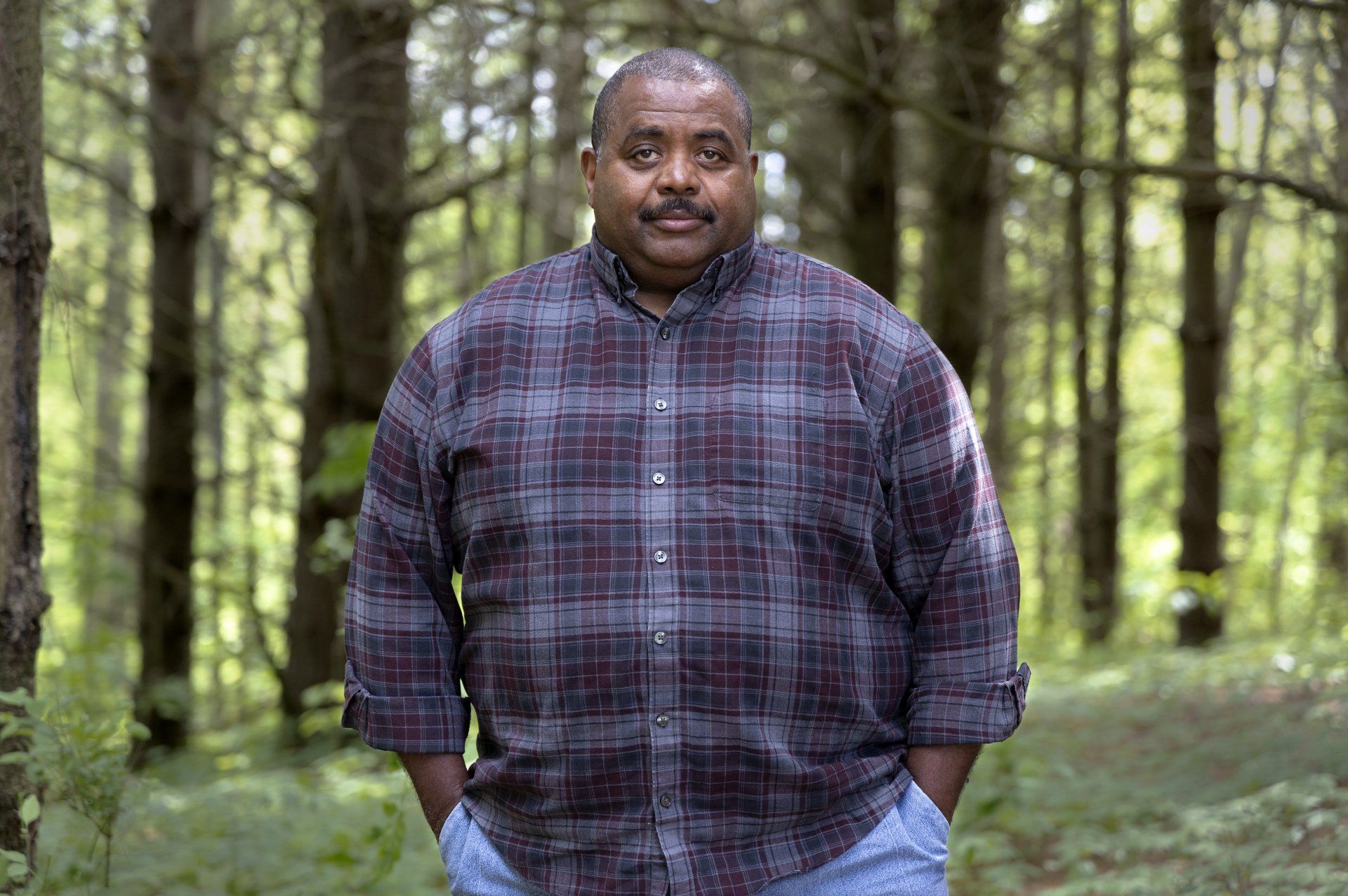
They told him Black people didn’t live in Barry County, but Darryl Newton didn’t care. One day in 1997, his wife, lost in the backroads of Barry County, stumbled on a house. It sat at the end of a dead-end gravel road surrounded by woods. She called him right away. She told him she had found their house. Despite warnings about Barry County from his coworkers at Meijer in Grand Rapids, Newton has lived in Barry County for 25 years. He refers to the county as “Barry,” as if it’s a longtime friend. He cherishes the peace, the quiet and the fact that he doesn’t feel pressure to always lock his doors. It’s where he has raised his kids, sent them to school and, as a self-described “football nut,” logged nearly two decades as a football coach. For five years, he volunteered with the Hastings youth football program, spending every Saturday, 8 a.m. to 8 p.m., coaching, announcing and serving up food. People still know him as the “pickle guy” because he stocked the snack stand with this fan favorite. Later, he would coach football in Middleville for 12 years, serving as both the president and vice president of the youth league. “It's a great community. I’ve loved living here, it’s just...” he said, pausing and sighing, “you have to get used to it.” Darryl Newton is a 59-year-old man from Ypsilanti who cheers for the Philadelphia 76ers, likes to hunt, loves to grill, served in the military, goes to church and lives in Barry County as a Black person. He could work in Barry County and live in Grand Rapids, Lansing, Battle Creek or Kalamazoo. Each has a larger Black community, but he chooses to live in Barry County, which is 96.6 percent white and 0.7 percent Black. Hastings is just 0.1 percent Black. The Hastings Banner spent more than a month with Black residents in the community to learn more about their daily experiences in Barry County. Many said they enjoy living here and, for the most part, people in the community treat their families with kindness and decency. But many admitted to feeling like outsiders. All have experienced some form of racism. There’s one memory that sticks with Newton. A few weeks after arriving in Barry County, Newton’s son came home with bumps and bruises. As he had walked in Hastings, a few kids picked a fight with him. They called him a racial slur typically directed at Black people. But Newton wasn’t surprised. “This is normal, it's going to happen,” he told his wife, “and it's going to happen to him again. And again.” Growing up in Barry County Isaac Schipper was the only Black student in his grade from first grade to high school graduation at Thornapple Kellogg Schools. And everyone knew it. “Oh, that's Isaac,” other students would say when new people visited the school, “you'll recognize him right away. He sticks out.” “That's just a fact of living out here,” Schipper said. “Black people stick out like a sore thumb.” Schipper, 29, was adopted by white parents. His father is Barry County Judge Michael Schipper. Isaac identifies as bi-racial, with white and Black biological parents, although he said most people see him as Black. He graduated from Thornapple Kellogg in 2011, where he was a lineman on the 2010 all-conference football champion team. He attended Grand Valley State University and studied psychology – a result of “years of watching ‘Scrubs,’” he said. He spent a few years working in a hospice facility, but the experience left him burnt out and he started to think about a new career. In 2017, he took a job working in cafeterias in the Grand Rapids Public Schools and, in 2018, enrolled at Ferris State University to pursue a teaching degree. Before leaving Barry County, Schipper never really spent much time around other Black people. “There's not really any kind of Black culture out here is the best way to put it,” Schipper said. That changed when he moved away from Barry County. Going to college, working in Holland and living in downtown Grand Rapids made him more aware of the experiences of other people of color. But Schipper said he has never felt unsafe or threatened in Barry County. “There haven’t been a whole lot of racial encounters,” he said. He would recommend Black people live in Barry County. Schipper continues to live in Barry County while he works as a substitute teacher at Thornapple Kellogg. After finishing his degrees, he wants to return there permanently to teach in his childhood district, hopefully in fourth or fifth grade. Still, there’s one instance of racism that Schipper remembers: When he tried to date a girl. They started by flirting in gym class. They became close and Schipper visited her house, where her father watched his every move. Eventually, Schipper asked her to date. But she made excuse after excuse. After a while, she told him the truth – her father “didn’t feel comfortable” with them dating because of his skin color. Over the following year, her father became more comfortable with Schipper, but it was a revealing moment for him. “No one's going to say, ‘Oh, I'm against diversity,’ until it affects their lives personally,” he said. Blending in From the age 7 to 17, Vincente Relf Jr. never lived in a place for more than two years. Financial troubles, family disagreements or a change in jobs -- something always caused his family to relocate. He bounced around from Detroit to Southfield to Dearborn, even living in a shelter for a short period of time. In each place, he had to learn how to fit in. Relf, 26, calls himself a “chameleon.” “My whole life story is blending in, dude,” he said. A few weeks into his junior year of high school, Relf packed his life into five Kroger tubs and moved in with his sister in Grandville, a suburban community near Grand Rapids. Grandville required a different type of blending in. In Dearborn, his school was split almost evenly between white, Black and Arab students. In Grandville, he said there were maybe 20 Black people in the entire district and not many other people of color either. He felt the lack of diversity from the moment he arrived. People assumed he knew how to break into cars. One classmate said that she didn’t understand him because she “didn’t speak Black.” But Relf wanted to fit in. “I wanted to feel like I belonged because I live here now,” he said. “This is my home. I have to find a way of belonging. People are more accepting when you talk like them, sound like them, look like them, right?” Relf threw away his old clothes. When he walked home from school, he practiced speaking without slang. Relf said it gets exhausting, having to constantly code switch and change. But he said he “had to adapt to survive.” “I wanted to give people that different experience and I knew that when people saw me, if I talked the way that I talked, they were immediately going to categorize me as the Black guy they see on the news that has committed this crime,” he said. In 2018, Relf graduated from Davenport University with a degree in business management. Looking to buy a house and build some equity, he stumbled onto a place in Middleville with a big lot and the perfect amount of natural light. In September 2020, he made Middleville his home. In the back of his head, he wondered if he would find racial epithets scrawled on the front of his house. Within weeks, though, he felt more welcome. A local basketball coach invited him to play pick-up. Unprompted, a neighbor who looked like Santa Claus would plow his driveway after it snowed. Relf calls a different neighbor “the greatest guy ever.” Occasionally he’ll get the “oh, crap, there’s a Black guy in Middleville stare.” But he said that he “loves living in the country.” He loves the quiet, abundant space and having a home to call his own. When Relf calls his family in Detroit, he doesn’t think about how he speaks. But as he walks in Middleville, Relf said he is always conscious of how people see him as a Black man. “I'm always Black,” Relf said. “I will always be Black. I'm always aware that I'm Black. I don’t know, it’s just something I’m always aware of. I’m never not Black.” For the most part, Relf sticks to himself in Barry County. When he wants to do something fun, he heads to the Grand Rapids area. The summer concerts and downtown events here don’t appeal to him, and when he looks around, he sees no one who looks like him. “I feel like there's a community,” he said. “I just don't know if I feel a part of the Middleville community.” ‘Just wading in the water’ At church this past weekend, they shared petitions for prayer. As Desiree Holley-Sancimino sat in her pew, she couldn’t help but think about the Buffalo grocery store, where 10 Black people were murdered May 14 by a gunman under the sway of white supremacist ideologies. “The climb is very hard,” she said. “I cry out to the Lord, when is it going to end? Then we got this shooting in Buffalo now. This guy comes 200 miles away, he's checking out the climate, what people are shopping at the store and then sets up to murder people just because they're of a different color.” The prayer petitions asked for “hate to stop in the country.” They mentioned Ukraine. But none directly discussed the heinous shooting in Buffalo. Holley-Sancimino was disappointed. “We have to acknowledge that it exists,” she said. “We can't push it aside or use vague language.” Holley-Sancimino, 69, has witnessed and experienced racism during her entire life. Her great-great-great-grandfather woke up one morning in Mississippi to a burning cross on his front yard. After Holley’s grandparents came to Detroit, Holley-Sancimino’s mother was denied a job because her skin was “too dark.” Her brother was later bussed to a new school and told to “go back to Africa.” Holley-Sancimino has continued to deal with racism, even in Hastings. In the fall of 2021, her 11-year-old granddaughter was called a “dirty girl” as she stood on a sidewalk downtown. Holley-Sancimino called moving to Hastings a “culture shock.” She was born in the 1950s in Detroit, where she lived with Black, Italian, Lebanese, Polish, Asian and Mexican people. Diversity, she said, is the “spice of life.” “I've always loved diversity,” she said. “You gain so much when you live with people that are different from you and learn about their experience and where they came from, eating their food.” She lived in Detroit until she was 48. Then she bounced around between Athens, Ala., Atlanta, Denver and Detroit. She reconnected with a friend at a high school reunion and that friend became her husband. In 2019, Holley moved to Hastings to live with him. Since settling in Hastings, she has found comfort in her friendship with “five lovely ladies” and events like the Thornapple Arts Council Jazz Festival. Every Sunday, she sings in her choir. Holley-Sancimino wants to be a voice for change in Hastings. She shared the incident with her granddaughter in a letter to the editor to The Hastings Banner. During the summer of 2020, she spoke at an event for racial equity in downtown Hastings. She stresses the need for more diverse representation in schools and on the city council, and she has called on ministers to speak more about race from the pulpit. She participates in a regular community dialogue called “Roundtable Companions for Racial Equity” at Emmanuel Episcopal Church where they read books, talk about race and share “lots of tears.” Holley-Sancimino doesn’t want to hide. During an interview, she wore a hat that reads “Black Barbie” in pink, bedazzled letters. She likes to put on her Black Lives Matter shirt. “I don't care,” she said multiple times. Walking around town, Holley-Sancimino said she doesn’t feel unsafe. But she doesn’t always feel welcome or at ease either. That is especially true at community events, where a lot of people gather, but few of them are Black. “I'm just wading in the water,” she said. Whenever she sees a Black person, she stops them – on their porch, in the B2 Outlet Store or wherever she finds them. “We just talk, you know?” she said. “Not that we’re gonna agree on everything. But you got somebody that looks like you.” ‘So much pressure’ When Kenneth Jefferson enters a store, he runs through a mental checklist. No hoodie, no hands in his pockets. He says please and thank you, he always holds the door and he never, ever raises his voice. “100 percent manners everywhere I go,” he said. Black people, he said, “don't get a lot of chances,” and he is always cognizant of how he looks, talks and acts. He never wants to be seen as threatening. Sometimes Jefferson, 46, wishes he could read people’s minds. He wishes he could know what they are thinking when he cheers at a basketball game or passes them in a store. He wishes he could know how they perceive him and what makes them nervous when he is around. “I care. I shouldn't but I care,” he said. “I want to make everybody happy. I want to make everybody comfortable, which you can't. But I’m that person. I've always been a pleaser. One person uncomfortable makes me uncomfortable.” At the age of 4, Jefferson moved from Detroit to a 40-acre farm in Allegan, where his family was one of few Black people. They had an acre-and-a-half garden, cows, chickens and 800-pound pigs, the largest in the county at the time. Still, they had little money. Occasionally, their water or electricity got shut off and they had to boil snow for water or turn on the stove for heat. Jefferson would go on to graduate from college – the first in his family. As a young adult, he dabbled in modeling. He has worked as a coordinate-measuring machine operator and a junior quality engineer at an engineering plant. Later, he served as a radiological technologist for Spectrum Health. In 2010, Jefferson moved to Barry County. Twelve years later, he still doesn’t feel comfortable. “It wasn’t as scary as it is now,” he said 12 years later. He recalls being stopped by a state police officer while running in his neighborhood. Another time, cops were called to the high school when he was playing basketball with friends, some Black. In the Walmart parking lot, a person rolled down their car window and aimed a finger gun at him. The person, Jefferson later realized, lived down the road from him. Then, there are the everyday moments that make Jefferson feel like an outsider. The mental checklist he runs through when he walks outside. The overwhelming stares he receives when he walks into a store or a restaurant or a golf outing. “So much pressure,” he said, his voice quivering and exasperated. But Jefferson doesn’t plan to leave Barry County. This is where he has built a life for himself, where he plays basketball, golfs and fishes. During COVID, he built a green room in his garage, growing bell peppers, jalapenos, chili peppers, basil, strawberries, lettuce and onions. He wants to share with people in Barry County what it is like to be Black. Really, though, Jefferson doesn’t think his experience would be different anywhere else. This is just his reality of being Black in America. “I don't have anywhere else I would want to go. There's no city that, like, ‘Oh, I'm gonna go here and have a better life.’ … I think that, um,” he said, pausing to think, “yeah, I know, and that's a weird answer. I don't think anywhere else will change. That's who I'm supposed to be, just being a Black person.” What needs to change? As he waited to pick up his kids at St. Rose Elementary School, a little girl sprinted toward Darryl Newton, the former youth football coach who has lived in Barry County for 25 years. “I know you, I know you,” she said, with the biggest and brightest eyes. “I looked at her and said, ‘Well, how do you know me, honey?’” Newton remembered. “You’re Nick’s Black daddy,” she said. Heads turned. Parents rushed over. Everyone yelled, “Shush!” But Newton told them to stop. He saw a teaching opportunity. “Don’t correct her,” he said. “She’s talking about what she sees. Here's the point: I am Nick's daddy, and I am Black. And the minute you tell this young lady that ‘shhh, don't call him Black,’ then what you're saying is there's something wrong with him being Black.” “…Don't ever shush that because you're gonna say that something's wrong with me. And there's nothing wrong with me. “I always found in Barry County – if you don't get yourself riled up – that there's an opportunity to educate.” Newton’s schoolyard encounter underscores what other Black residents in Barry County said: Race and, more specifically, the experiences of Black people, are rarely discussed outside of their own homes. Some people are trying to create that public conversation. The Barry County Chamber of Commerce and Economic Development Alliance and Leadership Barry County, for example, created a program called “Courageous Conversations,” designed to discuss diversity issues. They are focused on creating videos with more diverse representation and developing a cohort called the “Flourish Group” for people who do not feel like they belong in Barry County. “It's very much on the forefront of all of our minds that we're trying to make Barry County more inclusive,” Chamber President/CEO Jennifer Heinzman said. As a learning and development specialist with Meijer Inc., Newton focused on teaching diversity for employees. He said that Barry County needs action related to racial equity, such as increased diversity on school boards. But, at the bare minimum, Newton believes change begins with more discussion. It begins with more public effort to learn from and acknowledge the experiences, bad and good, of Black people. It requires a thoughtful investigation into why Barry County looks the way it does, Newton said. Why a place so close to Grand Rapids, the second biggest city in the state, has a Black population of just 0.7 percent. “It's seeing what's not there that's more important,” he said. “And then ask yourself, but why? Why is that not there? And what are we missing from not having that there?”

